#uwe analysis
Text
I seriously think Emmelyn's role is going to be pivotal in giving Unicorn back their humanity and empathy.
As seen at the end of A Fateful Encounter and the beginning of What Lies Beneath, Emmelyn was more proficient with her powers and more effective when Melinda took control of their body. She immediately gave chase to the Evil, cornered her and was about to vanquish her once more, all by herself...
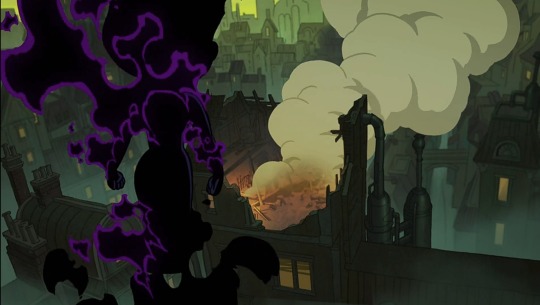
...until she saw the damage her powers caused to that poor family's home and lives.
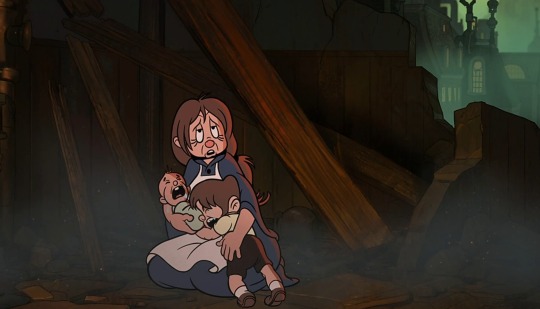
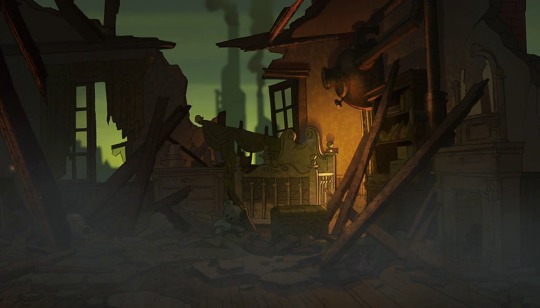
From then on, it's Emma who asserts herself over Melinda's soul again, horrified at the damage she caused.
But here's the thing, she's the only member of Unicorn who pays the poor woman and her kids any mind. Edred, despite witnessing the state the house is in, quickly brushes it off because Melinda let the Evil escape, not once sparing a glance to the innocent people whose lives they just essentially ruined.
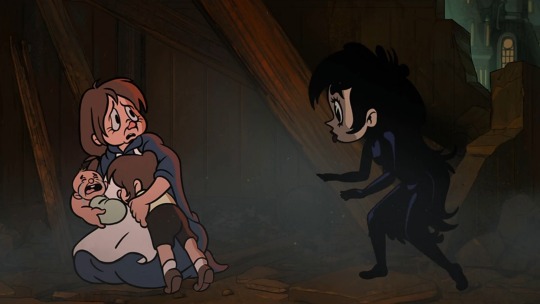
And that seems to be Unicorn's recurring flaw: they are so laser-focused on defeating the Evil in the name of humanity, they tend to overlook the individuals they're supposed to be trying to help.
This episode showcased this brilliantly: when Melinda's fire destroyed the bridge and threatened with harming lots of innocents, Edred and Copernicus were quick to solve the problem. The civilians even cheered for them!
But when it comes to dealing with people's problems individually, they tend to disregard them in the name of the greater good. Unicorn will do what's objectively right or best, which is usually the needs of many over one person's issues or desires, but they won't stop to think about the possible consequences of their actions beyond vanquishing the Evil.
This is especially prevalent during Emma and Melinda's confrontation last episode. Through Melinda's callous treatment of Emma and refusal to see things from her point of view, as she is devoted to their cause and Emma's refusal to merge with her directly threatens their mission, she also fails to understand asserting herself over Emma only serves in alienating her more.
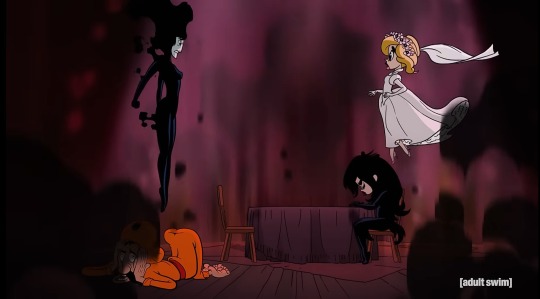
If only Melinda had tried a gentler approach in explaining to Emma she is not responsible for the turn her life took but they really need to work together or hers won't be the only life that prematurely comes to an end, then chances are Emma wouldn't be resisting her and her powers as much as she's doing right now.
Edred has this same problem too, as evidenced through his interactions with Winston. Instead of explaining that the woman he loves isn't exactly there anymore, he coldly tries to push him aside, to get him to leave Emmelyn alone. He doesn't even try to relate to the boy's problem, even when they're essentially one and the same! Both Edred and Winston are terrified of losing their beloved because she's not acting like herself and, no matter what they do, she is constantly pushing them away. But because Edred has grown unaffected by people's struggles outside of saving them from the Evil, not helped by the fact that his actions are also fuelled by jealousy, he makes no effort to sympathise with Winston or even offer an apology or words of comfort. He just wants him out of their way and away from Melinda.
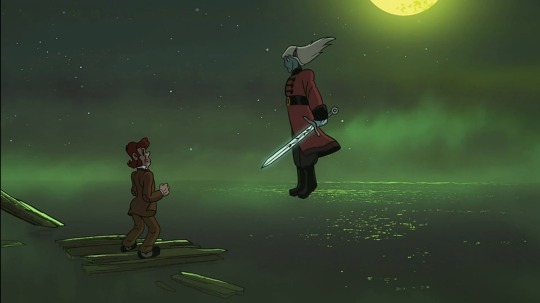
But with Emmelyn, it's precisely the fact that Emma can actually get Melinda to snap out of it and take control over their body that she realised their current actions are doing more harm than good to the people they're supposed to protect. Meaning, once she explains to the others why she's holding back, how fully giving in to Melinda means more people will suffer in the long run unless they start doing things differently, maybe it'll help Edred, Seng, and Copernicus realise they need to understand those they're trying to protect better and that tackling things as a whole won't always be the answer. Otherwise, they're only going to do more harm than good and, as with their reincarnations, the cycle will only begin once more.
#btw Emmelyn is how I call Emma/Melinda unless I'm talking about one of them in specific#since she's in this weird stare where she's simultaneously both women snd neither#unicorn: warriors eternal#unicorn warriors eternal#unicorn warriors eternal spoilers#uwe#uwe spoilers#uwe analysis#emmelyn#emma fairfax#melinda#melinda the sorceress#edred#edred the warrior elf#winston#seng#seng the cosmic monk#copernicus#genndy tartakovsky#toonami#adult swim
602 notes
·
View notes
Text
Fun use of composition in UWE Part 2!
This one is pretty simple, might be the more direct use of Fibonacci I’ve ever seen.


With Copernicus there, took the term “Golden Ratio” quite literally.
#Unicorn Warriors Eternal#Genndy Tartakovsky#uwe#melinda#copernicus#cartoon network#art#animation#adult swim#analysis#fibonacci#golden ratio
76 notes
·
View notes
Text
About the Wet Rag
Just bc I haven't seen anyone say it yet:
Could be that Edred's childishness is actually the influence of Demitri Dynamo's personality. We saw in the beginning how smug the guy was doing fake tricks, and when Edred is trying to win Emma/Melinda over, he puts on the same smug face, like he's 100% confident he'll impress her.
Especially after that little glimpse we saw of Edred when he first met Melinda; Edred himself is more serious, level headed, and considerate.
It could be that Emma/Melinda's lost affection for Edred isn't just because of Emma, but also because of Demitri changing Edred's personality, just as Melinda changed Emma's. They're simply not the same people anymore. Melinda would probably be just as frustrated with Edred's behavior as Emma is.
Which, like, if that's the case then damn dude, that sucks for literally everyone.
#unicorn: warriors eternal#uwe#edred#character analysis#theory#emma fairfax#demitri dynamo#uwe melinda#brownthoughts00
20 notes
·
View notes
Note
I love this ask!
A Persuasion Campus novel please. (Must go lie down at the thought of Ciarán Hinds as a college professor.)
So, to address your parenthetical first: you've seen Circle of Friends, right? I didn't love it, and his role, iirc, is not sympathetic; however:

The academic gown over the three-piece suit is just gratuitous. AHEM. A Jane Austen campus novel AU is tricky, I think, because I have to undo most if not all of the family relationships in favor of other connective nexuses (nexes? nexii? help). Here goes. I might have spent too much time thinking about this over my morning tea.
Sir Walter Elliott is, inevitably, the college president. He's photogenic. He loves uttering empty and incorrect platitudes about his own achievements. He loves schmoozing with important people. Unfortunately, he's perfect for the job.
The Admiral and Sophy have been at the university for ages, and the Admiral loves to tell the story about how he was her spousal hire in 1987, not the other way around.
Elizabeth is using family money to take a never-ending PhD in fashion history. She's always weirdly vague about her project, and finds a way not to participate in chapter exchanges. Rumor says that it's Sir Walter's influence keeping her from being kicked out.
Mary took an M.A., married money, and has been (dis)contentedly living on the UWS ever since. It's not quite true to say that she's never looked back. She visits colloquia and other open department functions with a depressing persistency, and appears not to notice that this is sometimes awkward for people who are united by their passion for a subject in which she never excelled.
Louisa and Henrietta are grad students, and remarkably carefree with it. Somehow their work does, in fact, get done.
Harville is, I think, Wentworth's sailing club buddy.
Mr. Elliott will be a smarmy visiting academic at another area institution. Unfortunately, I know his type. Eventually it will come out that he's eternally "visiting" because of a plagiarism scandal in his past.
Lady Russell is, of course, Anne's PhD supervisor. Who else would be in loco parentis and giving prudent and unwelcome advice?
Anne administers the interdisciplinary center in eighteenth-century studies. While she is several decades younger than those who usually take on such jobs, this works out well for several reasons. She has a head for detail, and is conscientious to a fault. Also, the faculty are (almost) all extremely fond of her, and the importance of this in getting academics to comply with bureaucratic necessities cannot be overstated. She's an alum of the program, and did finish her PhD. Lady Russell still sometimes sighs, a little too audibly, when she sees her erstwhile star student being competent in the front office. But care-taking duties during her mother's long illness meant that Anne's progress through the degree was slow, and international conference travel to boost her reputation didn't happen. The job market, with its precarity and long-distance upheavals, didn't either. So here is Anne, still in the department. Anne herself may not have the career or the life she dreamed of, but she has employment and health insurance, which is more than many recent PhDs can say. She sings in a choir. She tells herself that she has a good life.
Frederick Wentworth was Sophy's student. (I will miss her big sister energy, but a PhD supervisor also has the lifelong privilege of dragging you and telling you to get your life together, so here we are.) Lady Russell thought he was always going to burn out. Sure, he looked good on paper: a bright scholarship student from a state school in the fields of nowhere. But his project, studying contested empire and constructions of masculinity in the Atlantic world using network analysis, was always too ambitious. Until it wasn't.
With several fellowships, a postdoc, and a visiting position at a SLAC behind him -- the OUP monograph is in press -- Frederick Wentworth is back. Lady Russell wasn't on the search committee. But not only is Frederick Wentworth competent to teach the gender studies courses the department wants and the survey courses the university wants, he is also willing to take on the military history courses that the jocks want. "Thank God," says Sophy bluntly, once he's accepted the offer, "I won't have to read their opinions of my haircut in the student evals anymore." Also, there's that OUP monograph. No one quite says out loud that they have in their midst that rarest of creatures, the photogenic male historian who actually is a historian. But the consciousness runs through the halls like a current. This, for the department, could be a beginning.
For Anne, it is something else. It's not that they dated, exactly. It was never that formal, or that limited. Only in retrospect, really, did she realize that it was odd to spend an entire day walking around looking at architecture, or to end up with intertwined ankles on a museum bench, or to cook freely in each other's kitchens, before having an understanding. The understanding came. It was a November night, and they were sitting on a bench in Riverside Park, and she didn't feel the cold. They had agreed that they'd go on the job market together. They would read each other's applications the way they read each other's dissertation chapters. And they'd move to wherever one of them got a tenure-track job first. And then everything fell apart. Anne still thinks that Dr. Russell was right, that it wouldn't have been fair to hold him. More, she thinks that she herself could not have borne to lose what they had in a slow death of long-distance phone calls, too-brief visits, awkward negotiations of what they could and could not expect. Better to be sensible. Better to make a clean break while they were still young, still resilient. But she has never felt resilient. And now Frederick Wentworth is back.
396 notes
·
View notes
Text
The oft-used description of early humans as “hunter-gatherers” should be changed to “gatherer-hunters,” at least in the Andes of South America, according to groundbreaking research led by a University of Wyoming archaeologist.
Archaeologists long thought that early human diets were meat-based. However, Assistant Professor Randy Haas’ analysis of the remains of 24 individuals from the Wilamaya Patjxa and Soro Mik'aya Patjxa burial sites in Peru shows that early human diets in the Andes Mountains were composed of 80 percent plant matter and 20 percent meat.
The study, titled Stable isotope chemistry reveals plant-dominant diet among early foragers on the Andean Altiplano, has been published by the peer-reviewed journal PLOS ONE. It applies methods in isotope chemistry and statistical modeling to unveil a surprising twist in early Andean societies and traditional hunter-gatherer narratives.
“Conventional wisdom holds that early human economies focused on hunting -- an idea that has led to a number of high-protein dietary fads, such as the Paleodiet,” Haas says. “Our analysis shows that the diets were composed of 80 percent plant matter and 20 percent meat.”
For these early humans of the Andes, spanning from 9,000 to 6,500 years ago, there is indeed evidence that hunting of large mammals provided some of their diets. But the new analysis of the isotopic composition of the human bones shows that plant foods made up the majority of individual diets, with meat playing a secondary role.
Additionally, burnt plant remains from the sites and distinct dental-wear patterns on the individuals’ upper incisors indicate that tubers -- or plants that grow underground, such as potatoes -- likely were the most prominent subsistence resource.
“Our combination of isotope chemistry, paleoethnobotanical and zooarchaeological methods offers the clearest and most accurate picture of early Andean diets to date,” Haas says. “These findings update our understanding of earliest forager economies and the pathway to agricultural economies in the Andean Highlands.”
98 notes
·
View notes
Note
Hello!!! Would you please make something about the scene before Zach sleeps in cam's bed in UWS? ( Like immediately after his mission with joe) cause he said he got stupid? Thanks!
Hello! You guys! This goes in the basket with the scene where he finds Macey instead of Cammie. I love this scene. I think I have an in depth analysis of it in my drafts. (Update: I DO. I'll post it next.) Let's do it!
Rachel softly closed the door to her office. The man inside would be fine for now. The boy in the hallway, however...
"Thanks for getting him back in one piece." Rachel told Zach. He was leaning against the wall, hands in his pockets, and not looking at her.
"It was the least I could do," was all he said. "I can, um,"
"Stay." Rachel interrupted. "Zach, these things happen. But you both made it back," she placed a hand on his shoulder. "That's what is important."
Zach looked from her hand and then finally to her face. Finding only sincerity there, he nodded.
She smiled at him. "Good. Besides, I think my daughter will be very upset if she doesn't get to see you when she gets back."
Zach inhaled, of course Rachel had anticipated the question he had wanted to ask. "Is she...?"
"She should be back soon," Rachel said. "You should wait for her."
Zach nodded. He moved to follow her back into her office, but Rachel blocked him. "Why don't you head up to the girls room?" she asked.
Zach seemed taken aback by the suggestion. He blinked at her, trying to judge if it was a test or something. Rachel just smiled at him. "They should go up there directly after arriving anyway. If not, that's where I'll send her. She'll be happy to see you."
It struck Zach in that moment that somewhere along the way, Rachel had decided she trusted him.
She was still smiling at him. "I trust you know the way?" When he nodded, she waved her arm in dismissal. She went back into the office to tend to Joe while Zach made his way through the halls.
As excited as he was to see Cammie, the guilt over what happened on his mission with Joe was weighing on him. With every step he realized he didn't know how Cammie would be returning. What if she had been hurt? Rachel hadn't said anything, but maybe she didn't know yet.
He reached her door and paused. Maybe this was a bad idea. Or maybe it was the self sabotage talking.
The girls had locked their door, which Zach had anticipated. That hadn't been a problem in the past (a thought that he hated out of context). It did strike him that Rachel had also likely anticipated that and that Zach would still be able to get in.
Their lives were weird.
The room was different without at least some of the girls present. It still had the lived in, homey feel and character of the four girls it was just... still.
He found himself moving around the room, the door clicking shut behind him. He had never spent a long amount of time in the girls room and when he had been in there his focus had been on one thing in particular. It was like, for the first time, he processed there were things in that room. Books and make up and scrunchies and pens and trinkets pertaining to each girl. He found himself walking around Cammie's bed, gaze trained on her bedside table.
There was a picture of her and her mom and another of her with Bex and Liz, probably from their first year. Next to them were photobooth pictures of them with Macey, possibly from the semester Zach had been there. There was a tube of chapstick, a few hair ties, a necklace, and other usual items. It was interesting how a few years ago he would have looked at all those items to learn about her, but now it didn't tell him anything he didn't already know.
Without anything else to occupy himself, he suddenly felt awkward. What was he supposed to do until she got back? Standing in the room felt weird, but so did sitting at her desk, or on her bed. He was still by her bedside table so he sat on the bed, testing it out. He wasn't facing the door so he didn't feel quite like a puppy waiting for it's person to get home.
It was then that he realized, in typical Cammie fashion, she hadn't bothered to make her bed before leaving. Which he could single her out for because all of her roommates had made theirs.
Smiling, he at least rearranged her comforter so it looked more put together. She'd likely be tired when she got back, he knew he was. Although, it hadn't hit him until he sat on her bed again. The beds at the Gallagher Academy were the most comfortable he'd ever been fortunate enough to sleep on.
Careful to keep his shoes off her bed, he let himself recline back. His head fell on Cammie's pillow and he became engulfed in the scent of her shampoo. And just... her. It was sweet but subtle. Flowery and... something else.
Zach hadn't planned on his eyes drifting shut. He caught himself a few times and tried to shake himself out of it. He couldn't, however, bring himself to get up again.
Ultimately, Cammie won out and he drifted off to sleep. Surrounded by her both physically and in his thoughts.
It paled in comparison to waking up to the sound of her saying his name. He opened his eyes and there she was. Perfect.
19 notes
·
View notes
Text
RESOURCE MASTERLIST
UW Rowing & The Boys in the Boat
Character Bio Presentation
Created by yours truly! Brief, but fairly thorough background information for each of the boys, specifically highlighting their personalities and relevant background info as described in the book. Here’s an example:

Conibear Shellhouse
Floorplan blueprints, information, and video footage of the Conibear Shellhouse, the current Shellhouse used by the University of Washington Rowing Team (for my modern AU friends)
Writing Resources
Coxswain Recordings and Analysis
This webpage by readyallrow.org is a compilation of dozens of videos of practices, head races, sprint races at both the collegiate and junior level, as well as videos from master and elite coxswains. At the end of on the list is a link to a post breaking down and conducting an in depth analysis on the footage.
Rowing Accidents
This is a list of rowing accidents compiled on the RowSafeUSA website. It lists details of rowing accidents in chronological order, and though it might not list every accident in history it is one of the most comprehensive lists I’ve seen.
“The coxswain in winter”
An amazing article that goes into depths about modern-day coxswains and what they do especially during winter months when the oarsmen are doing a lot of physical training and erging indoors. It discusses how some coxswains participate in the workouts with the oarsmen and also highlights how some cox (specifically those with medical limitations like asthma) deal with the fact that they feel bad for not being able to participate in the physical training.
#the titles are links btw#resources#fic resources#masterlist#accidents#references#olie likes research#information#research#this will be added to!
14 notes
·
View notes
Text
I feel like I should say this:
Hopeless UW!Sans has mental health issues, but his condition is a product of fiction, and is very different from mental conditions that actually exist!
Don’t give names to his condition and please be respectful (´・ω・`)
And here's a little analysis of his fictional mental condition:
- He hears screams in his head when he's nervous.
The voices aren't well defined, but he knows those are all the screams he heard during the resets and they stuck in his head. Most of them are his or of the people he and Flowey killed.
- When the screams get too loud to even understand what's around himself he starts screaming too, hoping to focus on an outside noise.
- He never wanted to kill anyone, he was forced to.
The only one ever wanted to kill is his own Flowey.
Yet he may be violent towards those he hates (or other Floweys), but he will try to hold back… most of the time.
- He's so rude and edgy because of his trust issues and his LV.
Also because he's tired of everyone lol however he still has compassion.
- He fears hugs due to how often he got tied up and crushed to death. He will hug only those he trusts.
- In a timeline he was closed in a psychiatric hospital by mistake (or not, since the people who hated him framed him :D).
That experience also traumatized him.
- I'm not explaining now how the Void in Underwizard works, but it is making an interference in Hopeless' head and now he can see Gaster. Yet he believes he's just a hallucination.
- When he talks to Alex, the bucket, he doesn't actually hear her voice. She's like an imaginary friend, but he's convinced she's real and will continue to deny otherwise.
- Though he quite often hear voices and has some visual hallucinations, but he won't tell you if he's experiencing any.
- If left alone, be sure he won't be ok.
He will start overthinking, and well... you may find him on the floor crying.
- He often goes from having zero self-confidence to "BOW TO ME I AM THE BEST!".
- He's called "Hopeless" not only because he is hopeless, but because his unwavering hope has led to his downfall.
If he had given up, he might have become like Classic!Sans, lazy, or like Killer!Sans, emotionless.
#cw: mental health#hopeless uw!sans#the roleplayed timeline#Whooo me dropping some extra lore and facts.#I probably forgot something o3o
13 notes
·
View notes
Text
Linguistic Jobs: Interview with a Data Manager & Digital Archivist
This month’s interview is with Julia Miller, a Data Manager and Digital Archivist who uses their Linguistics background to archive high-quality endangered language materials. As a recent PhD graduate, I greatly appreciated Julia’s validating advice that the absence of a tenure-track position or a position in the tech industry does not qualify as “failing”. This message is on-brand for this series, as one of the intentions behind these interviews is to demonstrate that Linguistics training is applicable to lots of jobs, not just the academic ones. Additionally, this interview contains some refreshing and practical advice regarding postdoc and PhD management.
You can follow Julia on Twitter @Spectregraph.
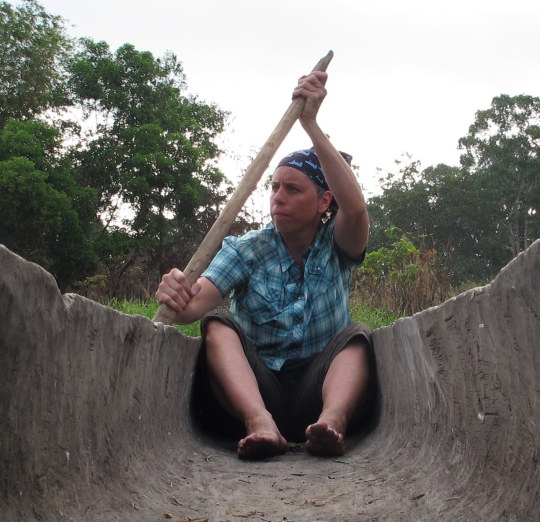
What did you study at university?
I began my undergrad studies in Portland, focusing on art (printmaking) and languages (Russian, French, German, later adding Arabic and Latin). I loved languages and exploring the patterns; at this point I didn’t know about Linguistics. After a short break from school and a bit of reflection, I moved to Seattle, enrolled at the University of Washington, switched my area of study to Linguistics and ended up getting the hat-trick of degrees in Linguistics all from UW: BA (1998), MA (2003), and PhD (2013). My research focused on acoustic phonetics and sociolinguistics; my PhD project explored acoustic properties of lexical tone in two dialects of the Dene language Dane-zaa, spoken in NE British Columbia. During my MA and PhD studies, I was fortunate to have been part of the DOBES Documentation of Endangered Languages program, working on a collaborative documentation project of the Dane-zaa (Beaver) language, which offered funding for tuition and fieldwork, as well as providing me with training in field methods, language documentation & description, and archiving. When I was in the final stages of writing my PhD thesis, I relocated to Australia and began working with PARADISEC, based at their node at the Australian National University (ANU), in order to expand what I knew about digital language archives, building upon what I learned working with the Language Archive for the Beaver DOBES project. I then received a Postdoctoral fellowship at the ANU**, working on another DOBES-funded collaborative documentation project, working with the languages of the Morehead District, Nen, Komnzo, Idi, Nmbo, spoken in the Western Province in Papua New Guinea. The postdoc work included phonetic analyses, sociolinguistic interviews, mapping projects, as well data management and archiving. Despite my love of phonetic description and social network analysis, by the time I submitted my PhD thesis, it was clear that I was more interested in data management and archiving than in linguistic analyses. This was a difficult, yet freeing revelation.
**I do NOT suggest starting a postdoc when you are still writing your completely unrelated PhD thesis! I submitted my thesis in between field trips to PNG.
What is your job?
I am the senior data manager for the ARC Centre of Excellence for the Dynamics of Language (CoEDL) as well as a digital archivist for the Pacific and Regional Archive for Digital Sources in Endangered Cultures (PARADISEC). I facilitate the archiving of indigenous and minority language digital material collected by CoEDL members and affiliates from the region, as well as other PARADISEC depositors world-wide. I offer training for researchers, students, and anyone interested in data management and archiving procedures. I liaise with other archives, cultural institutions, and language centres for collaboration. Despite not holding an academic position, teaching is still a large part of my daily work; I offer guest lectures in Field Methods and Digital Humanities courses and run intensive training sessions in digital archiving and data management for university researchers and job placement participants. I have developed curricula, technical workflows and archiving best-practice advice for audiences with different skillsets and goals. I also manage audio and manuscript digitising studios, where we digitise audio cassettes, reel-to-reel tapes, and field notebooks, etc. and I maintain a lending library of field equipment and offer training and advice.
How does your linguistics training help you in your job?
It would appear that my entire PhD path has prepared me for my current job. All the training I received in fieldwork, collaborative research, language documentation & description, and archiving allows me to understand the work our depositors are carrying out. I can offer informed advice and try to anticipate issues they may face in the field regarding data management, equipment failures, etc. And having archived my own materials in multiple archives, I can offer commiseration (and advice) as someone who has had to create metadata databases, follow strict formatting guidelines for A/V files, and adhere to deadlines based on funding agreements.
What was the transition from university to work like for you?
I am still working at a university, but the transition from an academic role to what is considered a non-academic role has been a bit of a challenge. I find I still do a lot of research for my work, and then try to pass on what I have learned in training modules and technical writing projects. I am fortunate to be in an environment that allows me to carry out what could be considered ‘supplemental’ work. Knowing that teaching and outreach are very important to me will help me on my career path as it evolves.
Do you have any advice you wish someone had given to you about linguistics/careers/university?
As a MA/PhD student, I would have loved to have been told of career options outside of Academia (or Big Tech), or even just been reassured that it is a valid option to not pursue tenure track jobs. I think many of my cohorts and I felt as if we failed or let down our professors by not getting a tenure track position in Linguistics. I’m glad to see that the culture of academia is changing and that there is support and advice made more available to students now.
Related interviews:
Interview with a Metadata Specialist and Genealogist
Interview with a Data Scientist
Interview with a Museum Curator
Interview with a Librarian
Interview with a Computational Linguist
Recent interviews:
Interview with a Natural Language Annotation Lead
Interview with an EMLS/Linguistics instructor & mother of four
Interview with a Performing Artiste and Freelance Editor
Interview with a Hawaiian and Tahitian language Instructor, Translator & Radio Host
Interview with a Customer Success Manager
Resources:
The full Linguist Jobs Interview List
The Linguist Jobs tag for the most recent interviews
The Linguistics Jobs slide deck (overview, resources and activities)
The Linguistics Jobs Interview series is edited by Martha Tsutsui Billins. Martha is a linguist whose research focuses on the Ryukyuan language Amami Oshima, specifically honourifics and politeness strategies in the context of language endangerment. Martha runs Field Notes, a podcast about linguistic fieldwork.
#data management#digital archivist#digital archiving#language archiving#endangered language archiving#ling jobs#linguist#language#linguistics#linguistics jobs#archiving
103 notes
·
View notes
Text
Believe it or not, the narrative foreshadowed Edred and Winston were meant to be parallel characters of each other early on, even before Edred was properly introduced.
So far we've seen many instances where Edred could be very petty while, for the most part, Winston only deviates from his usual committed and gentlemanly persona when Edred pushes their romantic rivalry on him.
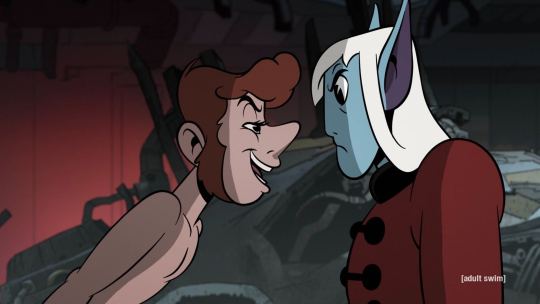
However, it's worth noting that Winston's inherent pettiness has always been there, instead of something he developed under stressful circumstances. Namely, as soon as the second episode, where we learned through a flashback he was glad Alfie's school, an orphanage, was going to shut down.
While it's understandable being miffed at losing because the opposing team didn't play fair, wishing a group of orphaned kids lose their only home over it is going too far.

So yeah, regardless of their rivalry, both Winston and Edred are equally petty people. Thank you for coming to my Ted Talk.
#unicorn: warriors eternal#unicorn warriors eternal#unicorn warriors enternal spoilers#uwe#uwe spoilers#uwe analysis#winston#edred#edred the warrior elf#emma fairfax#melinda#melinda the sorceress#emmelyn#alfie#seng#seng the cosmic monk#genndy tartakovsky#adult swim#toonami
426 notes
·
View notes
Text
A new analysis led by a University of Wyoming researcher shows that brackish or salty groundwater has the potential to replace fresh water to cool coal- and natural gas-fired power plants and strengthen resilience in the energy infrastructure, although there's a cost associated with doing so.
With freshwater supplies threatened due to drought, climate change and rapid socioeconomic growth, water competition is increasing between the electric power sector and other sectors. While transitioning to a low-carbon energy future, decarbonization of fossil fuel-fired power plants by carbon capture and storage would significantly increase water consumption and exacerbate water competition. Water challenges drive power plant operators to explore alternative water sources.
"Nontraditional water sources can be deployed to help cope with climate-induced water risks and tackle the increasing water demand for decarbonization of fossil fuel-fired power plants," wrote the research team, led by Haibo Zhai, UW's Roy and Caryl Cline Distinguished Chair in the College of Engineering and Physical Sciences. "Treatment of brackish groundwater for thermoelectric generation cooling can help alleviate potential competition for freshwater resources among various sectors in water-stressed regions."
Read more.
12 notes
·
View notes
Photo

How did the Butterfly Nebula get its wings? It's complicated Planetary nebulae form when red giant stars expel their outermost layers as they run out of helium fuel—becoming hot, dense white dwarf stars that are roughly the size of Earth. The material that was shed, enriched in carbon, forms dazzling patterns as it is blown gently into the interstellar medium. Most planetary nebulae are roughly circular, but a few have an hourglass or wing-like shape, like the aptly named "Butterfly Nebula." These shapes are likely formed by the gravitational tug of a second star orbiting the nebula's "parent" star, causing the material to expand into a pair of nebular lobes, or "wings." Like an expanding balloon, the wings grow over time without changing their original shape. Yet new research shows that something is amiss in the Butterfly Nebula. When a team led by astronomers at the University of Washington compared two exposures of the Butterfly Nebula taken by the Hubble Space Telescope in 2009 and 2020, they saw dramatic changes in the material within the wings. As they will report on Jan. 12 at the 241st meeting of the American Astronomical Society in Seattle, powerful winds are driving complex alterations of material within the nebula's wings. They want to understand how such activity is possible from what should be a "sputtering, largely moribund star with no remaining fuel." "The Butterfly Nebula is extreme for the mass, speed and complexity of its ejections from its central star, whose temperature is more than 200 times hotter than the sun yet is just slightly larger than the Earth," said team leader Bruce Balick, a UW professor emeritus of astronomy. "I've been comparing Hubble images for years and I've never seen anything quite like it." The team compared high-quality Hubble images taken 11 years apart to chart the speeds and growth patterns of features within the nebula's wings. The bulk of the analysis was performed by Lars Borchert, a graduate student at Aarhus University in Denmark who participated in this study as a UW undergraduate student. Structural changes within the Butterfly Nebula between 2009 and 2020. Various features have moved from the black regions into the white ones during the 11-year interval. The image reveals the surprisingly complex growth patterns caused by multiple ejections from the nebula’s unseen central star in the past two millennia. Credit: Lars Borchert and Bruce Balick/University of Washington Borchert discovered roughly half a dozen "jets"—beginning about 2,300 years ago and ending 900 years ago—pushing material out in a series of asymmetrical outflows. Material in the outer portions of the nebula is moving rapidly, at about 500 miles per second, while material closer to the hidden central star is expanding much more slowly, at about a tenth of that speed. Paths of the jets cross one another, forming "messy" structures and growth patterns within the wings. The nebula's multi-polar and swiftly changing interior structure is not easy to explain using existing models of how planetary nebulae form and evolve, according to Balick. The star at the center of the nebula, which is hidden by dust and debris, could have merged with a companion star or drew off material from a nearby star, creating complex magnetic fields and generating the jets. "At this point, these are all just hypotheses," said Balick. "What this shows us is that we don't fully understand the full range of shaping processes at work when planetary nebulae form. The next step is to image the nebular center using the James Webb Space Telescope, since infrared light from the star can penetrate through the dust." Stars like our sun will swell into a red giant and form planetary nebulae someday, expelling carbon and other relatively heavy elements into the interstellar medium to form star systems and planets in the far future. This new research, and other "time-lapse" analyses of planetary nebulae, can help illustrate not just how the materials for the star systems of tomorrow will take shape, but also how the building blocks of our own oasis were produced and gathered billions of years ago. "It's a creation story that is happening over and over again in our universe," said Balick. "The shaping processes provide key insight into the history and impacts of the stellar activity." Other team members are Joel Kastner of the Rochester Institute of Technology and Adam Frank of the University of Rochester. IMAGE....A color rendition of NGC 6302, the Butterfly Nebula, created from black-and-white exposures taken by the Hubble Space Telescope in 2019 and 2020. In the violet-colored regions, strong stellar winds are actively reshaping the nebular wings over the past 900 years. The other features range in age from 1200 to 2300 years. Credit: Bruce Balick/University of Washington/Joel Kastner/Paula Baez Moraga/Rochester Institute of Technology/Space Telescope Science Institute
21 notes
·
View notes
Text
Welcome to My Blog!

My name is Rice, and I am Weird_Writer on Ao3. I use he/him pronouns, and I am transmasculine. I'm pansexual. I am 19 years old. I am Greek American. English is my primary language.
Here are some random personality types that have been applied to me because they are funny to know: INFJ, Cancer, and 3w4.
I am working on my Bachelor's of Science as a Major in Biomedical Sciences with a Minor in Philosophy at UW-Oshkosh, and my academic plan is to get a PhD in Epidemiology. My career goal is work with the CDC and do statistical analysis to help populations affected by preventable diseases.
I love Ikemen Vampire, espeically anime vampire Shakespeare, and I also love actual William Shakespeare as well.
I love to read and write, but for the past three years, I have been in a bad writer's block.
Blog Navigation Time!
- Don't be afraid to send me asks or messages. I love to talk lol
- I tag my reblogs with #ricereblogs, and I tag posts where I believe I am rambling with #ricerambles.
Some Epic Posts
-Spotify Playlists for the entire Ikemen Vampire cast
-The Ikemen Vampire Cast as MLP
Sebastian, Leonardo, Charles, Napoleon, Faust, Comte, Jean, Isaac, Theo, Shakespeare, and Arthur
-Ikemen Vampire GIFS
Arthur, Charles, Vlad, and Shakespeare
Leonardo, Napoleon, Faust, Dazai, and Isaac
Jean GIF (Let's take testosterone together)
-Kiss Me Goodnight (Ikevamp Shakespeare Fluff Fanfic)
-Blank Slate AU (Ikevamp)
-What if Sebastian was the Protag (Ikevamp)
-Ikemen Vampire Inspired Eyeliner
-Misc. Anime Inspired Eyeliner
-Theo & Arthur Discord Meme
Bonus: My brother is @dualityflipped. You should check out his account. He posts a lot about bugs and the environment.
4 notes
·
View notes
Text
Warming oceans have decimated marine parasites -- but that's not a good thing
https://sciencespies.com/nature/warming-oceans-have-decimated-marine-parasites-but-thats-not-a-good-thing/
Warming oceans have decimated marine parasites -- but that's not a good thing
More than a century of preserved fish specimens offer a rare glimpse into long-term trends in parasite populations. New research from the University of Washington shows that fish parasites plummeted from 1880 to 2019, a 140-year stretch when Puget Sound — their habitat and the second largest estuary in the mainland U.S. — warmed significantly.
The study, published the week of Jan. 9 in the Proceedings of the National Academy of Sciences, is the world’s largest and longest dataset of wildlife parasite abundance. It suggests that parasites may be especially vulnerable to a changing climate.
“People generally think that climate change will cause parasites to thrive, that we will see an increase in parasite outbreaks as the world warms,” said lead author Chelsea Wood, a UW associate professor of aquatic and fishery sciences. “For some parasite species that may be true, but parasites depend on hosts, and that makes them particularly vulnerable in a changing world where the fate of hosts is being reshuffled.”
While some parasites have a single host species, many parasites travel between host species. Eggs are carried in one host species, the larvae emerge and infect another host and the adult may reach maturity in a third host before laying eggs.
For parasites that rely on three or more host species during their lifecycle — including more than half the parasite species identified in the study’s Puget Sound fish — analysis of historic fish specimens showed an 11% average decline per decade in abundance. Of 10 parasite species that had disappeared completely by 1980, nine relied on three or more hosts.
“Our results show that parasites with one or two host species stayed pretty steady, but parasites with three or more hosts crashed,” Wood said. “The degree of decline was severe. It would trigger conservation action if it occurred in the types of species that people care about, like mammals or birds.”
And while parasites inspire fear or disgust — especially for people who associate them with illness in themselves, their kids or their pets — the result is worrying news for ecosystems, Wood said.
“Parasite ecology is really in its infancy, but what we do know is that these complex-lifecycle parasites probably play an important role in pushing energy through food webs and in supporting top apex predators,” Wood said. She is one of the authors of a 2020 report laying out a conservation plan for parasites.
Wood’s study is among the first to use a new method for resurrecting information on parasite populations of the past. Mammals and birds are preserved with taxidermy, which retains parasites only on skin, feathers or fur. But fish, reptile and amphibian specimens are preserved in fluid, which also preserves any parasites living inside the animal at the time of its death.
The study focused on eight species of fish that are common in the behind-the-scenes collections of natural history museums. Most came from the UW Fish Collection at the Burke Museum of Natural History and Culture. The authors carefully sliced into the preserved fish specimens and then identified and counted the parasites they discovered inside before returning the specimens to the museums.
“It took a long time. It’s certainly not for the faint of heart,” Wood said. “I’d love to stick these fish in a blender and use a genomic technique to detect their parasites’ DNA, but the fish were first preserved with a fluid that shreds DNA. So what we did was just regular old shoe-leather parasitology.”
Among the multi-celled parasites they found were arthropods, or animals with an exoskeleton, including crustaceans, as well as what Wood describes as “unbelievably gorgeous tapeworms:” the Trypanorhyncha, whose heads are armed with hook-covered tentacles. In total, the team counted 17,259 parasites, of 85 types, from 699 fish specimens.
To explain the parasite declines, the authors considered three possible causes: how abundant the host species was in Puget Sound; pollution levels; and temperature at the ocean’s surface. The variable that best explained the decline in parasites was sea surface temperature, which rose by 1 degree Celsius (1.8 degrees Fahrenheit) in Puget Sound from 1950 to 2019.
A parasite that requires multiple hosts is like a delicate Rube Goldberg machine, Wood said. The complex series of steps they face to complete their lifecycle makes them vulnerable to disruption at any point along the way.
“This study demonstrates that major parasite declines have happened in Puget Sound. If this can happen unnoticed in an ecosystem as well studied as this one, where else might it be happening?” Wood said. “I hope our work inspires other ecologists to think about their own focal ecosystems, identify the right museum specimens, and see whether these trends are unique to Puget Sound, or something that is occurring in other places as well.
“Our result draws attention to the fact that parasitic species might be in real danger,” Wood added. “And that could mean bad stuff for us — not just fewer worms, but less of the parasite-driven ecosystem services that we’ve come to depend on.”
The research was funded by the National Science Foundation, the UW-based Cooperative Institute for Climate, Ocean, and Ecosystem Studies, the Alfred P. Sloan Foundation, the University of Washington and the Washington Research Foundation.
Co-authors are Rachel Welicky at Pennsylvania’s Neumann University, who did this work as a UW postdoctoral researcher; Whitney Preisser at Georgia’s Kennesaw State University, who did this work as a UW postdoctoral researcher; Katie Leslie, a UW Research Technologist; Natalie Mastick, a UW doctoral student; Katherine Maslenikov, manager of the UW Fish Collection at the Burke Museum of Natural History and Culture; Luke Tornabene and Timothy Essington, faculty members in aquatic and fishery sciences at the UW; Correigh Greene at NOAA’s Northwest Fisheries Science Center; and John M. Kinsella at HelmWest Laboratory in Missoula, Montana.
#Nature
4 notes
·
View notes
Text

I posted 537 times in 2022
144 posts created (27%)
393 posts reblogged (73%)
I tagged 536 of my posts in 2022
#musicals - 171 posts
#theatre - 170 posts
#elisabeth - 115 posts
#elisabeth das musical - 110 posts
#der tod - 75 posts
#kronprinz rudolf - 65 posts
#actors - 52 posts
#máté kamarás - 45 posts
#music - 34 posts
#fanart - 33 posts
Longest Tag: 140 characters
#most (young) people's view on what media and culture is comes from like. watching netflix shows with varying degrees of scrutiny and thought
My Top Posts in 2022:
#5

Der Tod (Uwe Kröger) and Rudolf (Andreas Bieber), Elisabeth Vienna 1992
95 notes - Posted September 10, 2022
#4

Shoutout to this youtube commenter and this youtube commenter ONLY
110 notes - Posted October 2, 2022
#3
youtube
I made a video essay! A week of sleepless nights went into this but I think it was worth it >:D
I tried to explain context thoroughly enough that this could be watched and understood even by those with no prior knowledge of the show, so definitely give it a try even if you’re not familiar with Elisabeth das Musical. (And if you are familiar, do it for the sourced analysis. Or the countless der Tod clips.)
113 notes - Posted September 15, 2022
#2

rb and tag yourselves in the tags
125 notes - Posted October 18, 2022
My #1 post of 2022


Mark Seibert and Lukas Perman performing Die Schatten werden länger (Elisabeth, Schönbrunn 2022)
or as I like to call it: ‘famous musical actors playing with cat toys on national television, colourised’
163 notes - Posted July 1, 2022
Get your Tumblr 2022 Year in Review →
2 notes
·
View notes